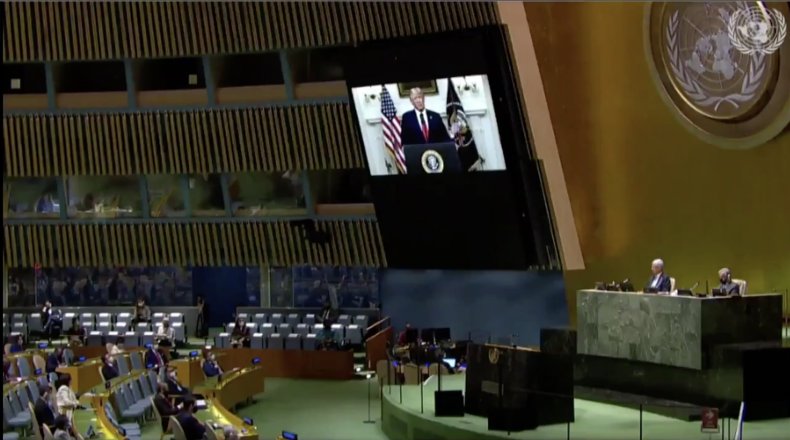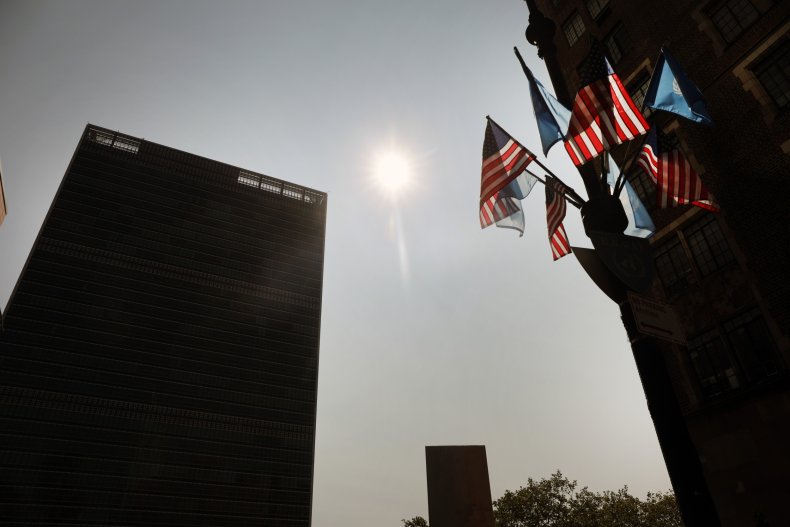The leaders of China and Russia dedicated their annual United Nations remarks to praising the dawn of a more multipolar world, while President Donald Trump took the podium to attack the Chinese Communist Party and to defend U.S. leadership.
In his virtual address to the 75th session of the U.N. General Assembly, Trump said Tuesday the nations of the world were once again locked in "a great global struggle" three-quarters of a century after World War II. This time, he said, the fight was "against the invisible enemy—the China virus."
The widely-disparaged term refers to the novel coronavirus pandemic, stemming from the COVID-19 disease that was first observed in the Chinese city of Wuhan late last year. The U.S. leader has solely blamed the People's Republic for having "unleashed this plague onto the world," as he said Tuesday.
"In the earliest days of the virus, China locked down travel domestically while allowing flights to leave China and infect the world," Trump said. "China condemned my travel ban on their country, even as they canceled domestic flights and locked citizens in their homes."
Newsweek subscription offers >
He also suggested the World Health Organization, which has led the global public health response to the disease, was in on the alleged conspiracy.
"The Chinese government and the World Health Organization—which is virtually controlled by China—falsely declared that there was no evidence of human-to-human transmission," Trump said. "Later, they falsely said people without symptoms would not spread the disease."
He laid the blame for the pandemic squarely on China.
"The United Nations must hold China accountable for their actions," Trump said.
Newsweek subscription offers >

He also criticized China's environmental record, and blamed U.N. member states for pandering to Beijing while being critical of Washington. He touted the U.S. as being ahead of the world in health, human rights, peacemaking and military power.
Chinese President Xi Jinping did not address the U.S. by name in his own comments, but instead emphasized the principle of "mutual respect and equality among all countries"—no matter their size.
"No country has the right to dominate global affairs, control the destiny of others, or keep advantages in development all to itself," Xi said. "Even less should one be allowed to do whatever it likes and be the hegemon, bully or boss of the world. Unilateralism is a dead end."
Beijing has been supportive of the WHO, which has defended itself against U.S. accusations of it being aligned with China.
"The World Health Organization is committed to the principles of neutrality and impartiality in working with our Member States," spokesperson Andrei Muchnik told Newsweek.
"WHO experts suspected possible human to human transmission of COVID-19 from the first reports they received on 31 Dec. WHO followed with swift action and alerted the world for preparedness early January," he added.
Nonetheless, the White House pulled out of the WHO in an unprecedented move, which was followed by Chinese pledges to increase funding to the organization.
The worsening U.S.-China dispute has quickly consumed international relations, with the Trump administration calling on countries to stop doing business with Beijing over alleged abuses in trade, human rights and geopolitical disputes. Both countries have targeted one another with tariffs as well as the expulsion of journalists and diplomats.
The feud has reached the extent to which U.N. Secretary-General António Guterres appealed to nations to prevent the emergence of another Cold War, calling for a new "21st-century multilateralism."
Xi also emphasized the need for multilateral cooperation, praising the U.N.'s role in world affairs.
"China will continue to be a true follower of multilateralism," Xi said. "It will stay actively engaged in reforming and developing the global governance system. It will firmly uphold the U.N.-centered international system, firmly uphold the international order underpinned by international law, and firmly defend the U.N.'s central role in international affairs."
Backing up the Chinese leader was Russian President Vladimir Putin. Moscow and Beijing have forged an increasingly close strategic partnership in recent years, and both find common ground in pushing back against the idea of U.S. dominance.
Putin called on the U.N. Security Council—whose five permanent members include victorious World War II nations Russia, China, the U.S, France and the United Kingdom—to take into consideration the interests of all countries in its decision making.

"This enormous potential and expertise of the U.N. is relevant and serves as a solid basis for moving ahead," Putin said.
"After all, just like any other international organization or regional entity, the U.N. should not grow stiff," he said, "but evolve in accordance with the dynamics of the 21st century and consistently adapt to the realia of the modern world that is indeed becoming more complicated, multipolar and multidimensional.
This is only the most recent public setback for the Trump administration at the U.N. Washington recently found itself standing nearly alone in the global body after objecting to a successful 169-2 resolution calling for "intensified international cooperation and solidarity to contain, mitigate and overcome the pandemic and its consequences."
Only Israel joined the U.S. in express opposition as result of a Cuban amendment that opposed unilateral sanctions and economic pressure. The two allies also stood together in the lonely fight to reinstate international sanctions against Iran, which joined major powers for a 2015 nuclear deal now considered defunct by the U.S., in a move widely considered illegal by most of the international community.
Iranian President Hassan Rouhani thanked the U.N. Security Council in his remarks for ignoring the U.S. opposition.
"This is a victory not just for Iran, but for the global community—during the transitional international order in the post-Western world—that an aspirant of hegemony is humiliated in such self-created isolation," Rouhani said.
World - Latest - Google News
September 23, 2020 at 04:52AM
https://ift.tt/302RAxF
Donald Trump Uses U.N. Attack China, Which Joins Russia, Others to Bash U.S. Unilateralism - Newsweek
World - Latest - Google News
https://ift.tt/2SeTG7d
Shoes Man Tutorial
Pos News Update
Meme Update
Korean Entertainment News
Japan News Update
Bagikan Berita Ini














0 Response to "Donald Trump Uses U.N. Attack China, Which Joins Russia, Others to Bash U.S. Unilateralism - Newsweek"
Post a Comment